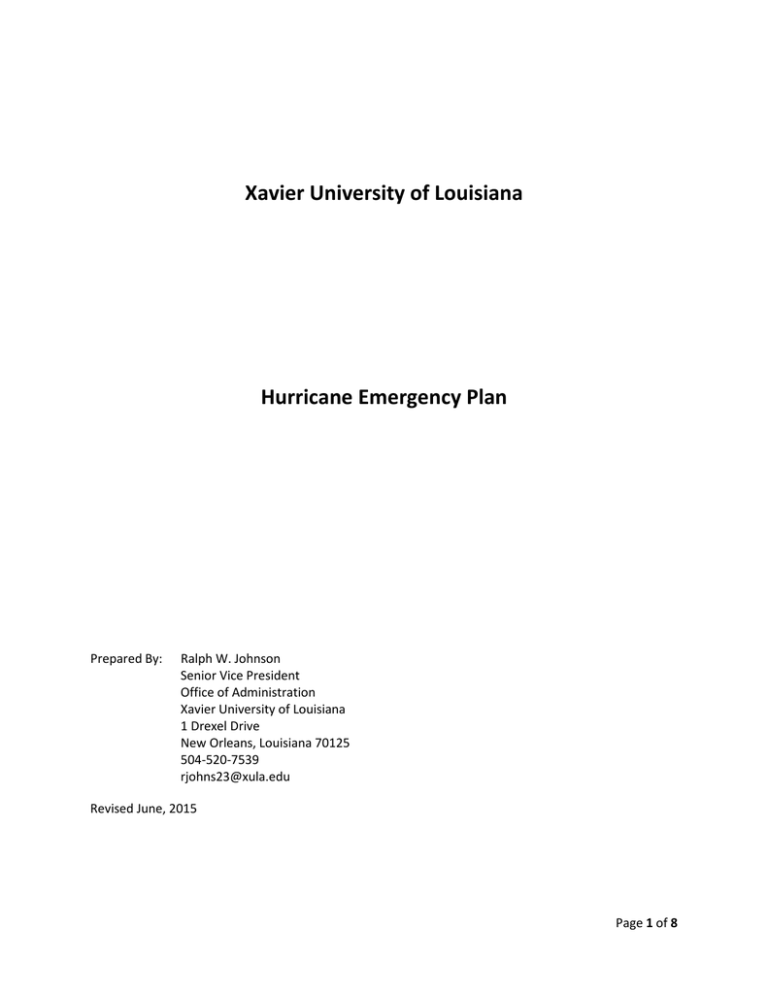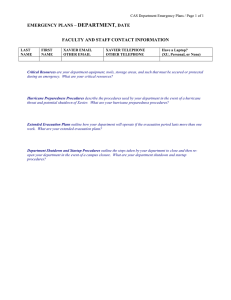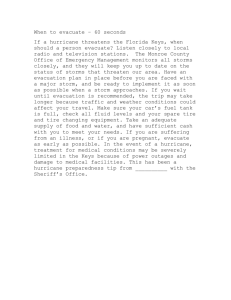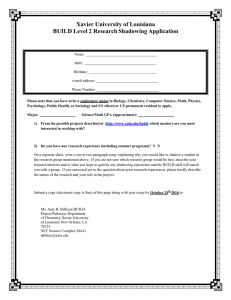Xavier University of Louisiana Hurricane Emergency Plan
advertisement

Xavier University of Louisiana Hurricane Emergency Plan Prepared By: Ralph W. Johnson Senior Vice President Office of Administration Xavier University of Louisiana 1 Drexel Drive New Orleans, Louisiana 70125 504-520-7539 rjohns23@xula.edu Revised June, 2015 Page 1 of 8 Hurricane Emergency Plan The Xavier University of Louisiana (XULA) Hurricane Emergency Plan is effective June 1, 2006 and supersedes all previous plans. With specific directions from Dr. Norman Francis, a group was chartered in April 2006 to prepare this document: • Calvin Tregre, Chair, Senior Vice President of Administration • Nedra Alcorn, Associate Vice president for Student Services • Ashton Baltrip, President of the Sophomore Class • Elizabeth Barron, Vice President of Academic Affairs • Warren Bell, Associate Vice President of University and Media Relations • Marion Bracy, Director of Facilities and Planning • Joseph Byrd, Vice President for Student Services • Regina McCutcheon, SGA President • Crystal Moore, President of the Junior Class • Catherine Lewis, Vice President of Technology Administration The Atlantic Ocean and Gulf of Mexico annual hurricane season extends from June 1 to November 30 each year. Official information and advice on hurricane and severe weather safety preparedness can be found at a variety of federal, state and local web sites – many of which are available as direct links from the XULA Emergency Preparedness information page. I. Hurricane Emergency Plan Team The President of Xavier University of Louisiana has designated the Senior Vice President of Administration as the Plan Coordinator of the XULA Hurricane Emergency Plan. During the emergency period, the Plan Coordinator has supervisory responsibility over departments and personnel who comprise the Hurricane Emergency Preparedness Team (HEPT). All decisions of the HEPT are recommendations to the University President as relayed by the Plan Coordinator. The following positions and personnel comprise the Hurricane Emergency Preparedness Team and are responsible for making decisions during the Pre-season Preparation, Threat Assessment, Class Cancellation, University Closure, and Aftermath stages: • Ralph Johnson, Chair, Senior Vice President for Administration • Nedra Alcorn, Associate Vice President for Student Services • Loren Blanchard, Provost & Senior Vice President for Academic Affairs • Judy Bracy, Director of Residential Life • Marion Bracy, Vice President of Facilities Planning and Management • Joseph Byrd, Vice President for Student Services • Duane Carkum, Chief, Campus Police • Kenneth St. Charles, Vice President for Institutional Advancement • Richard Tucker, Director, Office of University & Media Relations • Tony Moore, Vice President of Technology Administration Page 2 of 8 II. Emergency Information While the campus remains open prior to threatening weather, the University’s main web site at http://www.XULA.edu is the official source of University information. All messages of importance will be sent to all Xavier faculty, staff and students via campus-wide e-mail, posted on the XULA emergency web site and communicated to local news media. Xavier University’s e-mail address, xula.edu, is the official e-mail address for the campus and will be used for all official communications. This means that all students, faculty, and staff are expected to communicate via their xula.edu e-mail addresses. Students/faculty/staff are strongly encouraged to sign up for the ReGroup communication service from Dais Inc. The service enables the University to schedule, send, and track emergency messages via several different forms of communication. Registration is voluntary, but strongly encouraged. Signup requires a brief visit online to your XULA Banner Web account online @ http://www.xula.edu/studentlife/connected.php. Although external crisis communications and needed information will also be disseminated to the media, in the event of an actual emergency (hurricane or severe weather threat) especially one that causes the campus to be closed - the XULA emergency website @ http://www.xulaemergency.com, the toll-free telephone number (1-866-520-9852), and messages sent via the ReGroup communication service are to be considered the only official sources for information regarding Xavier University of Louisiana. Since the dangers of misinformation and false rumors are greatly increased during any emergency period, the President has designated the Vice President for Institutional Advancement as the official source of university announcements and spokesman for the university. III. Hurricane Emergency Plan The Hurricane Emergency Plan is divided into 5 stages. The action steps indicated in the stages may or may not be taken within the stages listed, depending on the circumstances of the storm and time of day in which the stage occurs. In addition, the Plan Coordinator may declare a change in stage at any time due to the unpredictable nature of hurricanes. 1. Pre-Season Preparation 2. Threat Assessment Stage 3. Class Cancellation Stage — students enact personal evacuation plan 4. University Closure Stage - faculty and staff required to leave campus 5. Aftermath Stage Page 3 of 8 STAGE ONE: Pre-Season Preparation Students are encouraged NOT to make airline reservations for Christmas break until the end of October due to the possibility of the fall semester being extended for university closure during an emergency. University closure of four class days or longer will result in the fall semester being extended. Students should not wait until a hurricane threatens the area to make personal plans. Each student is responsible for preparing a Personal Evacuation Plan and putting together a Disaster Supplies Kit (see below). Personal Evacuation Plans are to be submitted to the Director of Residential Life or the Vice President of Student Services prior to check in date for currently enrolled students. Personal Evacuation Plans for new students are to be submitted to the Director of Residential Life or the Vice President of Student Affairs by the first day of class. During Stage One there will be frequent updates. These updates will include broadcast e-mails and web postings. To prepare a Personal Evacuation Plan, students are to: • Identify ahead of time where they could go if they are told to evacuate. Students should choose several places – go home, especially if home is within a 200 mile radius of the University and home is away from the storm’s path, a friend's home in another town, a motel or a shelter. Generally, it is safer to evacuate to the north, further inland, than it is to evacuate to the east or west along the Gulf coast (i.e. Mobile, AL or Houston, TX) in case the storm turns just before landfall. • Keep handy the telephone numbers of these places as well as a road map of the area. Students may need to take alternative or unfamiliar routes if major roads are closed or clogged. • Identify a method of transportation. Students who have their own transportation may take other students with them to assist in the evacuation process. Students are reminded to notify their parents/family of their personal evacuation plan, especially where they are going if they are not going home. • Any resident student who does not submit a Personal Evacuation Plan must meet with the Director of Residence Life or Vice President of Student Services for assistance in developing a satisfactory (or acceptable) plan for evacuation. Disaster Supplies Kit Conditions during and after a hurricane will not be ideal and students should prepare for many contingencies. A Disaster Supplies Kit should be prepared in advance and include: • First aid kit and essential medications, especially prescription medications. • Extra set of car keys. • Canned food and can opener. • At least three gallons of water per person. • Protective clothing, rainwear, and bedding or sleeping bags. • Battery-powered radio, flashlight, and extra batteries. • Special items for infants, elderly, or disabled family members. Page 4 of 8 • For off-campus students, written instructions on how to turn off electricity, gas and water if authorities advise you to do so. (Remember, you'll need a professional to turn them back on.) • Documents, driver’s licenses, Social Security Card, proof of residence, insurance policies, wills, deeds, birth and marriage certificates, tax records, etc. Students are encouraged to: • Secure a full tank of gas for your vehicle as early as possible. • Arrange for a ride with someone else if you do not have a vehicle. • Obtain a supply of cash. • Take your personal laptop computer with you. • Back up data on your computer hard drives. STAGE TWO: Threat Assessment Stage Two begins when a weather pattern is elevated to tropical storm status and poses possible danger to Louisiana. The university may be under Stage Two for several weeks or days before predicted storm landfall. Under Stage Two: 1. Plan Coordinator convenes the Hurricane Emergency Preparedness Team to assess available factual information and begin implementation of the plan. Information is taken from the National Weather Service, and the City of New Orleans Office of Emergency Preparedness. 2. Plan Coordinator advises the Vice President for Institutional Advancement to update the Emergency Web Site and Emergency Information Line with current university operating status, special instructions, and next scheduled update. 3. Information is distributed to the Xavier community via email, web page, and posted statements in the University Center, and residence halls, if applicable. 4. Resident students receive explicit instructions from Residential Life staff regarding hurricane procedures. 5. Students are advised to begin researching available air, train, and bus schedules and fares if they are not evacuating by car. 6. Students are reminded to notify their parents/family of their personal evacuation plan, especially where they are going if they are not going home. 7. Parents of resident students should refer to the university emergency alert line and website for updates but may also contact the Office of Housing and Residence Life (504-520-7321), the Residence Halls’ information desk or University Police (504-520-7490). Page 5 of 8 8. Assign personnel to test emergency equipment, re-check supplies, and inventory, food, water, and medical supplies. 9. Within 48 -72 hours of predicted landfall, HEPT makes decision whether or not to cancel classes. Once the decision has been made to cancel classes, HEPT monitors the ongoing weather conditions and decides whether/when to close the University. Resident students should prepare to activate their Personal Emergency Plan (PEP) and register emergency relocation information with the residence hall staff. Office campus/non-students should check in with the Office of Student Services to register their Personal Emergency Plan. STAGE THREE: Classes Cancelled Upon cancellation of classes, non-resident students are required to leave campus and are not permitted to remain in any campus building for any reason. Resident students may remain in their resident hall rooms until they evacuate. Under Stage Three: 1. Plan Coordinator advises the Vice President for Institutional Advancement to update the Emergency Information Line and the Emergency Web Site to announce effective time of class cancellation. 2. Students are to activate their personal evacuation plans and begin leaving the storm area immediately. Resident students are to lock their room doors upon evacuation. 3. Parking lots are closed to non-permit holders. Students are advised not to leave vehicles parked on campus. 4. ALL remaining resident students who are unable to evacuate, must comply with the oral and written instructions of the Office of Student Services. Evacuation Plan – Resident Students Xavier University of Louisiana has revised its hurricane emergency plan in compliance with recommended changes of the City of New Orleans and Louisiana State Emergency Preparedness Offices. In addition, the City of New Orleans has also established various pick up points in the event of a hurricane evacuation that can be accessed via the following link: http://www.nola.gov/ready/evacuspots/ The University’s primary concern is the safety and well-being of its students, faculty and staff. It is recommended that evacuation outside the storm area under catastrophic storm conditions is the best possible way to ensure personal safety. Page 6 of 8 Therefore, to ensure the safety of Xavier University community, NO students, faculty or non-essential staff will be allowed to remain on campus under catastrophic storm conditions. While conditions during a hurricane emergency are not ideal, everyone will work to make the environment safe although the usual level of service or maintenance will not be available. Under the Evacuation Plan: 1. Resident students who are unable to evacuate on their own must have registered with Residence Life at the beginning of the summer and fall semesters. The Director of Residence Life will maintain an accurate and all-inclusive list of the students in need of assistance in a weather emergency. Students who are unable to activate their prearranged emergency plan or need further assistance to evacuate should immediately contact the Office of Housing and Residence Life and/or the Office of Student Services. 2. At an announced time and place, the pre-identified students will be contacted to pack minimal personal belongings (toiletries, towel, medications, and change of clothing) and be ready to relocate to a safe destination. Details of the destination will be made via the web as soon as possible. All personal belongings must be in a book bag or duffle/gym bag. NO SUITCASES WILL BE ALLOWED. Details will be made available at such time evacuation is necessary. 3. The Director of Residence Life verifies that all students have complied with the order to vacate and lock room doors. Under no circumstances will students be allowed to stay on campus once a decision has been made to evacuate students. STAGE FOUR: University Closure 1. Plan Coordinator advises the Vice President for Institutional Advancement to update the Emergency Web Site and the Emergency Information Line announcing emergency closure, special instructions, and next scheduled update. 2. Plan Coordinator directs Campus Police to lock campus buildings. All students, faculty, and staff must vacate. Once campus buildings are locked, no one will be permitted to enter campus buildings. 3. Campus Police officers will check all buildings for compliance with this requirement. All interior doors are locked, exterior doors are chained and locked if possible and laminated signs are posted on buildings announcing university closure and official "keep out/trespass warning" notice. 4. Plan Coordinator exchanges contact information and a proposed contact schedule with Chief of Police and Vice President of Facilities Planning and Management before leaving the campus to assist with critical communication. Page 7 of 8 STAGE FIVE: Aftermath No one is permitted to enter the campus unless approved by the Plan Coordinator until the university has been deemed as safe. Once the storm has passed and if the campus is accessible, Physical Plant and Campus Police inspect for damages to all buildings, grounds, and utilities and report to the Plan Coordinator on any unsafe campus conditions. Emergency repairs are made if practical. Under Stage Five: 1. Plan Coordinator, or his designee, communicates available factual information from the City of New Orleans Office of Emergency Preparedness, including flooding, road closures, curfews, etc. 2. If possible, Plan Coordinator advises the Vice President of Institutional Advancement to update the Emergency Information Line and the Emergency Web Site with current university operating status, special instructions, and next scheduled update; and the University & Media Relations staff will update news media with current university operating status. University is deemed as safe: Plan Coordinator announces official end of emergency and resident students are allowed to return to campus housing facilities. University is deemed unsafe: 1. Students and emergency personnel assisted with evacuation by the university are to make appropriate relocation arrangements for travel. All expenses incurred are the individual's responsibility. 2. Students, faculty, and staff should monitor the emergency website for official campus news, such as campus reopening and resumption of classes. Page 8 of 8


